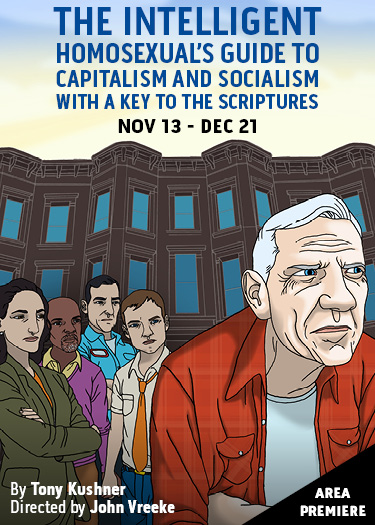
The
Intelligent
Homosexual's
Guide
To Capitalism
and Socialism
With
A Key To The Scriptures
November
13 - December 21, 2014
by
Tony Kushner
directed
by John Vreeke
 Featuring:
Josh Adams, Rena
Cherry Brown, Jenifer Deal,
Featuring:
Josh Adams, Rena
Cherry Brown, Jenifer Deal,
Tim Getman, Lisa Hodsoll, Lou Liberatore,
Susan Rome, Sue Jin Song, James Whalen,
Tom Wiggin and Michael Anthony Williams
When
retired longshoreman and lifelong Communist Gus summons his three
adult children to their Brooklyn home to explain why he’s selling the
family brownstone and ending his life, things don’t go exactly as
planned. The children bring their own dramas; Pill and his husband are
stumbling as an old flame resurfaces; Empty and her wife are squabbling
as they await the birth of their child; and Vic is confronting
long-buried truths. A deeply emotional battle over what makes life
worth living from Tony, Obie, Emmy and Pulitzer Prize winner Tony
Kushner in a newly updated epic making its DC premiere.
REVIEWS:
|
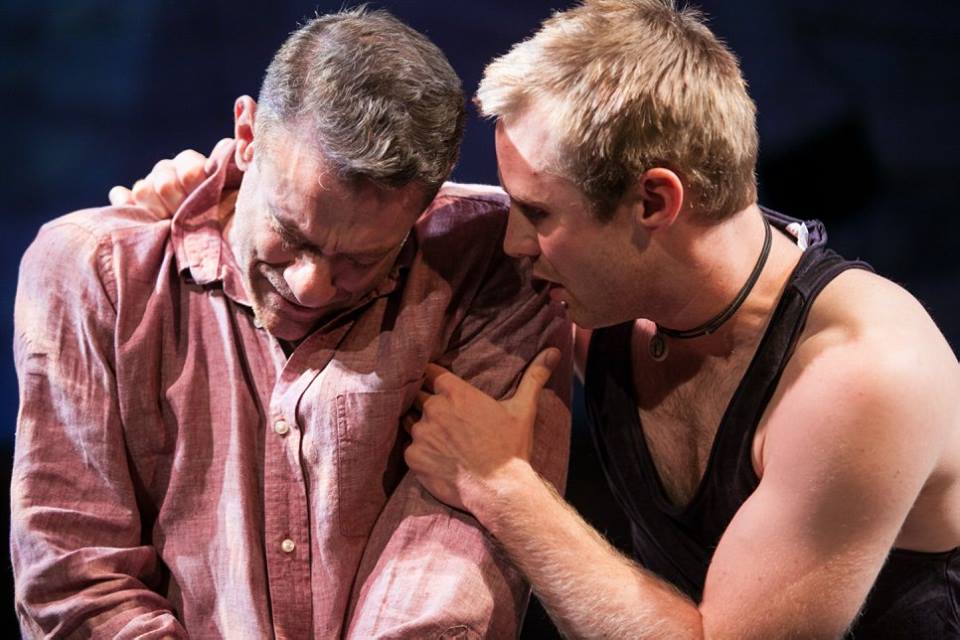 The
most emotionally, politically, and socially relevant and poignant
piece of evocative theatre to cross the stage in the last decade The
most emotionally, politically, and socially relevant and poignant
piece of evocative theatre to cross the stage in the last decade
"Director
John Vreeke completes the inconceivable task of pacing the
lengthy show with ease."
Theatre Bloom
Review by Amanda N. Gunther
Dreams are what
sustain the human need for remaining alive. They
perpetuate the notion of living until they are achieved. But what
happens when one’s dream is to no longer be living? Reality implodes
upon itself in a chaotic and cosmically imbalanced sense the result of
which is life viewed through the lenses of comically dark reality.
Everyone has problems, some more than most, and Theater J proudly
presents the Washington DC area premier of The Intelligent Homosexual’s
Guide to Capitalism and Socialism with a Key to the Scriptures, written
by Tony, Obie, Emmy and Pulitzer Prize-Winning playwright Tony Kushner.
The most emotionally, politically, and socially relevant and poignant
piece of evocative theatre to cross the stage in the last decade,
Kushner’s work, Directed by John Vreeke, captures the quintessence of
humanity and all its drama and baggage. Penned to perfection with
riveting plot sparks that expose deep vaults of emotional trauma the
work is exceptional and divinity to the written and performance craft.
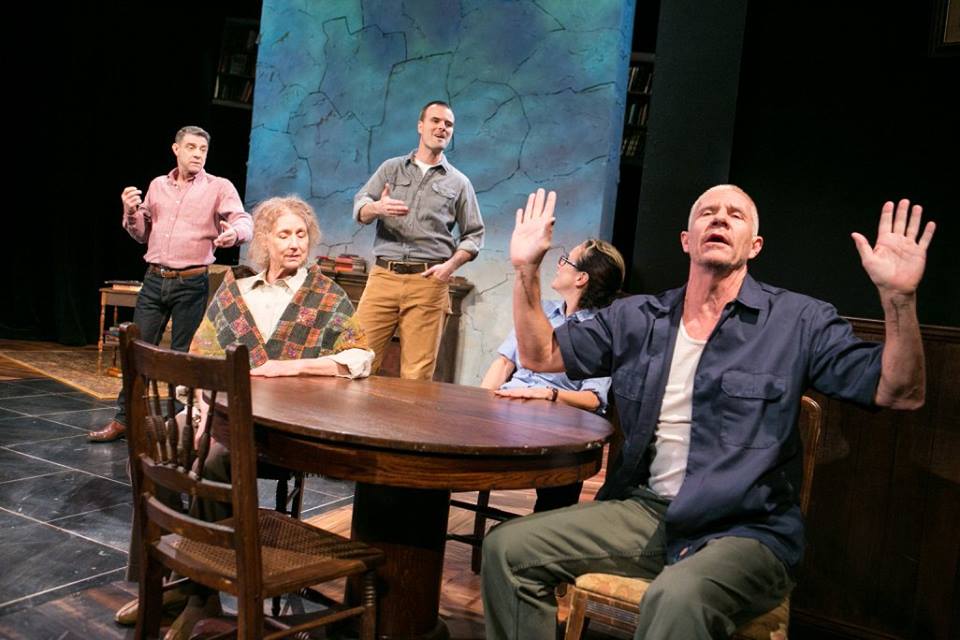 Maintaining a
simplistic set for a realist modern piece of comedic
drama seems the natural approach for a play whose focus is meant to be
on the characters, their developments, and their overarching
storylines. Set Designer Misha Kachman finds intriguing and
exceptionally clever ways to layer symbolism and artistic beauty into
the stage without cluttering or crowding it. The brownstone, around
which a central plot point of the show revolves, is hung suspended
above the stage jutting out toward the audience. This physical
representation of its weight literally hanging over the characters is
balanced perfectly with the projections of the interior that appear on
the back wall throughout the performance. Kachman uses these
projections throughout the performance to take us from inside the
family home out to the streets of Manhattan in a flash. The design work
is crisp and focused; realistic but not without meaning. Maintaining a
simplistic set for a realist modern piece of comedic
drama seems the natural approach for a play whose focus is meant to be
on the characters, their developments, and their overarching
storylines. Set Designer Misha Kachman finds intriguing and
exceptionally clever ways to layer symbolism and artistic beauty into
the stage without cluttering or crowding it. The brownstone, around
which a central plot point of the show revolves, is hung suspended
above the stage jutting out toward the audience. This physical
representation of its weight literally hanging over the characters is
balanced perfectly with the projections of the interior that appear on
the back wall throughout the performance. Kachman uses these
projections throughout the performance to take us from inside the
family home out to the streets of Manhattan in a flash. The design work
is crisp and focused; realistic but not without meaning.
Playwright
Tony Kushner pens perfection with this new work. It is a
story whose broad strokes touch on capitalism, Marxism, Communism,
religion, and politics as a whole. The more intricate threads woven
into the play are steeped in shades of romance, personal struggle,
love, death, and raw human emotion. The way Kushner creates these
hyper-realistic characters takes the audience so deeply into their
lives that it never feels like watching a play. The characters have
identifiable points of relativity that makes them open to the communal
human experience; a highly dysfunctional family that sure has fun
killing each other. Kushner’s words allow the audience to experience a
great deal of hilarity at these characters plight while simultaneously
exposing raw nerves that generate feelings of sympathy and empathy.
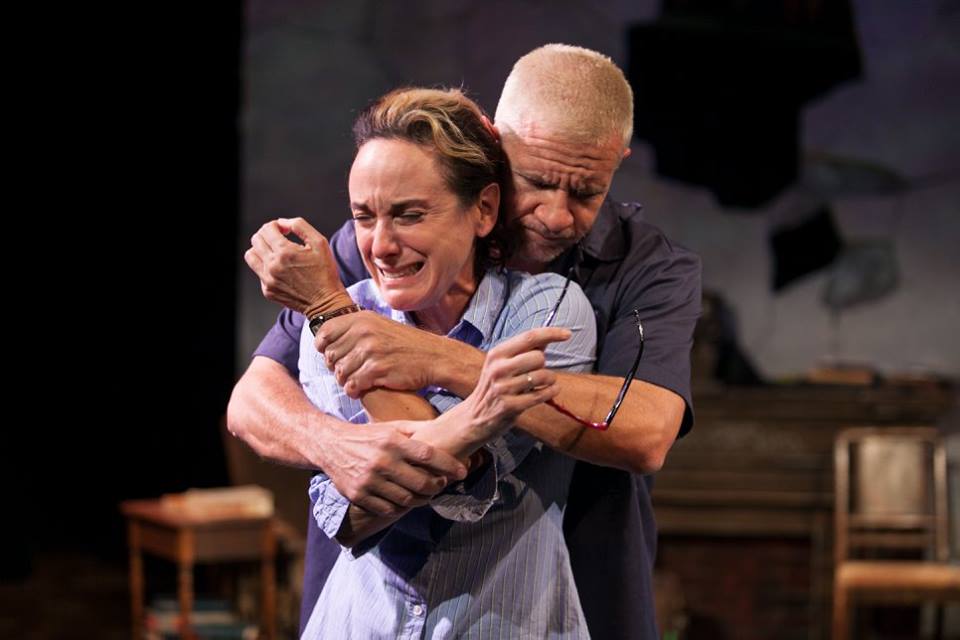 Each of
Kushner’s characters is thoroughly developed and startlingly
dynamic in their existence. His work explores the balance of personal
drama verses family drama, political beliefs juxtaposed against core
morals and principles. The stories wind themselves around each other;
an intricately woven loom of real human life— all the hilarity and
drama and agony— creating a tapestry of striking beauty that plays out
over the course of the evening upon the stage. Kushner has created
theatrical genius with this work; a stunning play that engages the
mind, captivates the heart, and touches the soul deeply. Each of
Kushner’s characters is thoroughly developed and startlingly
dynamic in their existence. His work explores the balance of personal
drama verses family drama, political beliefs juxtaposed against core
morals and principles. The stories wind themselves around each other;
an intricately woven loom of real human life— all the hilarity and
drama and agony— creating a tapestry of striking beauty that plays out
over the course of the evening upon the stage. Kushner has created
theatrical genius with this work; a stunning play that engages the
mind, captivates the heart, and touches the soul deeply.
Director
John Vreeke completes the inconceivable task of pacing the
lengthy show with ease. Never once does the play falter in its pacing
and by the show’s end it seems impossible that nearly four hours has
passed. Vreeke works through complex sections where the dialogue of
various arguments overlaps severely and creates an authentic family
experience in those moments. Kushner captures reality; families do not
argue in segments, they often shout all at once with a great deal of
topics thrown in the mix and Kushner translates this process onto the
stage. Under Vreeke’s practiced direction these moments read like
deliciously organized chaos; stimulating and exciting to behold even if
not everything that’s happening can be absorbed all at once.
Vreeke
has gathered an eclectic cast to fit the strange litany of
characters constructed within the production. Together as a whole their
performances are as fascinating and impressive as they are when they
are performing one-on-one scenes. The constant fluctuating dynamic of
the arguments in the performance keeps the audience on their toes; no
one person ever seems truly on one side of any argument or debate; the
perpetual upheaval an emotionally rewarding, albeit dizzying,
experience.
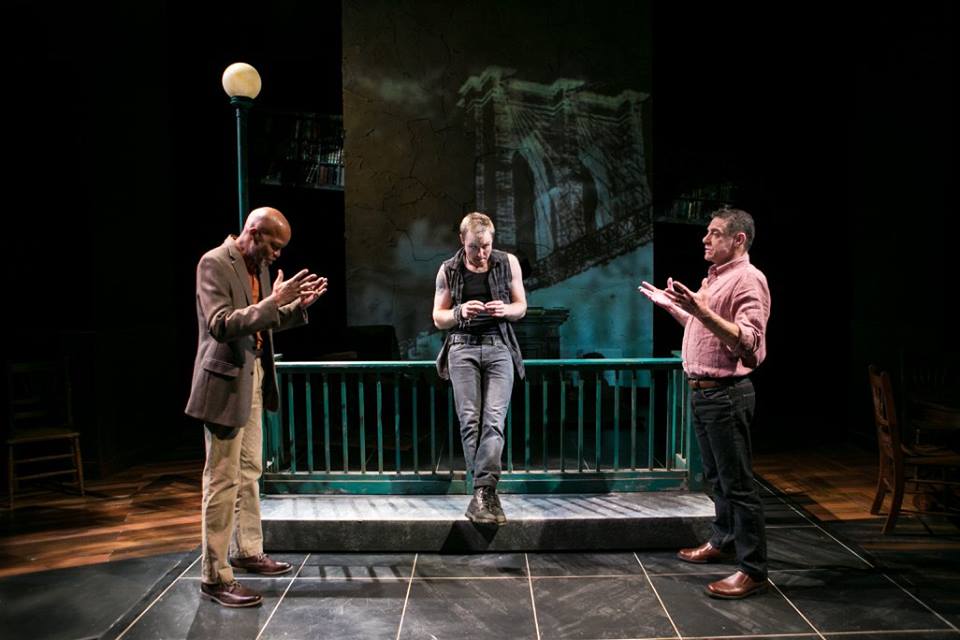
Everyone
is given their moment to radiate in this production and those
moments of radiance only serve to enhance the performance as a whole.
While Adam (James Whalen) may not seem like much at first, his ties to
the family are strong and his moment comes along near the end of Act
II. A spastic outburst from Whalen’s drunken character in that moment
extrapolates one of the major plot shockers that furthers the
absurdity, hilarity, and overall dysfunction of the family. Rena Cherry
Brown, playing the focused Zen Aunt Clio, has similar moments
throughout the performance though in a vastly different fashion. Brown
calmly delivers sarcasm with a tranquil approach to her zingers; a
curious juxtaposition that would otherwise be at war with itself if not
delivered in the talented hands of this particular actress. Brown’s
scene-stealing moment arrives when she makes her grand exit later in
the show; a moment too hilarious for words.
Hustlers and
Theologians have their place in this production as well.
Eli (Josh Adams) and Paul (Michael Anthony Williams) find their worlds
colliding around Pill (Lou Liberatore.) Liberatore’s character is one
of three children in the Marcantonio family, Paul his husband, and Eli
his hustler lover that has jeopardized his marriage. Both Adams and
Williams have exceptionally well-developed characters, portrayed
thoroughly and uniquely by these actors. Adams is the epitome of a
streetwise book-failed hustling youth; the modern slang, the nervous
energy always bounding through him. Williams is much more stalwart in
his physicality and his emotional unwillingness; a temper seething
through him that erupts frequently.
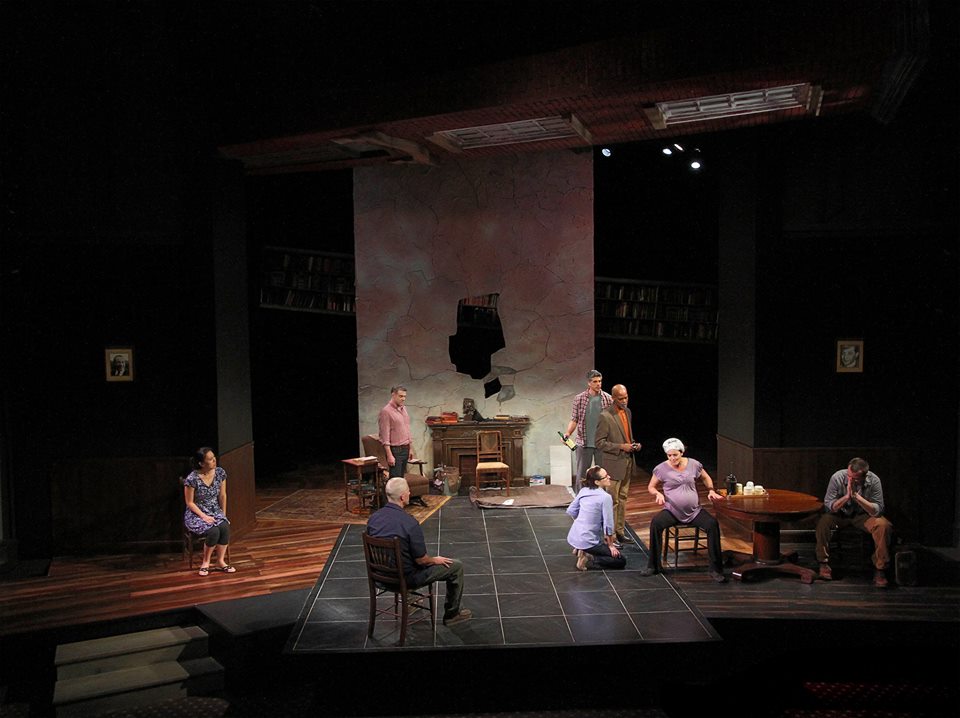
Liberatore,
as the eldest son, masters the affectations of a flamboyant
gay man who is not afraid to hide who he is or what sort of trouble his
current addictions have caused him in his life. Liberatore runs the
gambit of emotions throughout the performance; some of his most
vulnerable exposures occurring during intimate scenes with Adams. The
heartfelt conversation shared with his character’s father, Gus, tugs
firmly at the heartstrings and draws a tear to the eye most naturally.
Empty (Susan Rome) is
a truthful spitfire, much like her hot-headed
younger brother Vito (Tim Getman.) The pair are constantly at odds
throughout the performance, though Rome’s character takes far longer to
boil, much like a pressure cooker left on too long while Getman erupts
more volcanically; sporadic and frequent. Both give intense emotional
portrayals, particularly in their scenes with Gus. Getman finds his
character’s vulnerability and delivers a rewarding catharsis late in
the production. Rome delivers a truly exceptional performance later in
the show as well; a harrowing emotional eruption that underscores all
of her turmoil up to that point.
Gus
(Tom Wiggin) is the central focal point of the play. Wiggin
delivers the character with vigorous justice to a man on a mission. His
vocal gravel adds to the character’s natural age; his tottering gate to
creating the illusion that he has lived as long as he has. Thoroughly
engulfed in the beliefs of the party and of his own history; the
dynamic portrayal is phenomenal. The emotions felt are expressively
intense in Wiggin’s performance; award and praise worthy for a stunning
show well delivered.
The
opportunity to see one of the most relevant pieces of theatre of
the time won’t last long, and should not be missed. Theater J’s
production of Kushner’s newest work is the theatre in which humankind
can experience life fully and thoroughly this season.
Review by Amanda
N. Gunther
|
Kushner’s
sprawling, ambitious work that forces us to think once again about
class struggles and the power of the people.
There
is also something grand about the acting, thunderous and carved
as if these are characters written for the ages.
DC
Theatre Scene
Review
by Jayne Blanchard
Coworkers:
How was your weekend?
Me: Great! I saw this nearly four-hour play in
D.C. about labor unions and the American Communist Party!
Coworkers:
[Sounds of crickets chirping]
To
put it mildly, Tony Kushner’s gargantuan, garrulous play The
Intelligent Homosexual’s Guide to Capitalism and Socialism with a Key
to the Scriptures is not everybody’s cup of borscht.
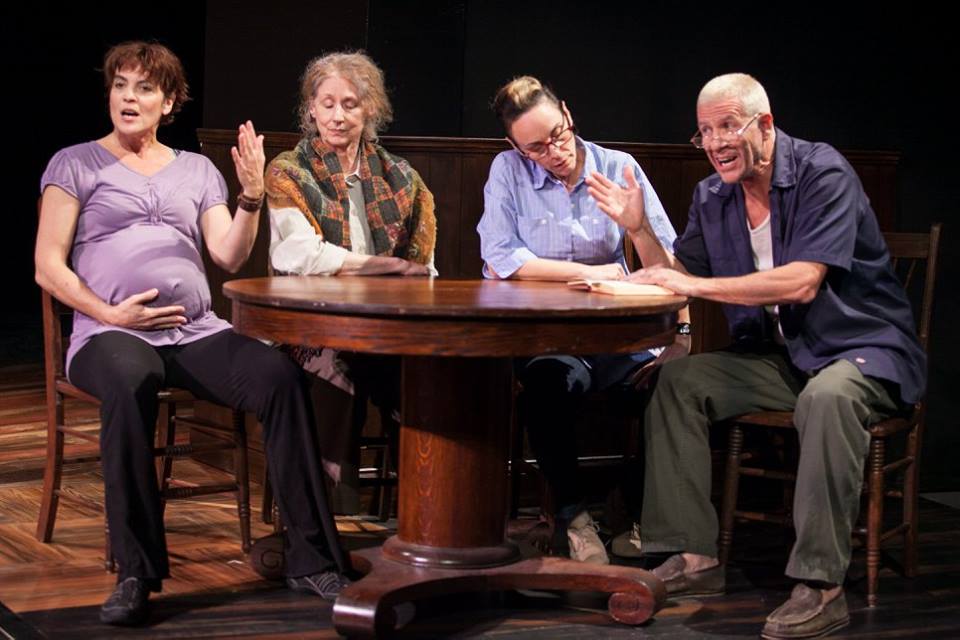 You have to love words, luxurious skeins of verbiage
that stretch out like an endless Persian carpet, metaphoric flights of
fancy that form like fat pearls in the actors’ mouths, speeches so
labyrinthine that the master of the convoluted sentence—William
Faulkner—would doff his trilby with a whistle and concede “Tony, you
win!” You have to love words, luxurious skeins of verbiage
that stretch out like an endless Persian carpet, metaphoric flights of
fancy that form like fat pearls in the actors’ mouths, speeches so
labyrinthine that the master of the convoluted sentence—William
Faulkner—would doff his trilby with a whistle and concede “Tony, you
win!”
You
think August Wilson or George Bernard Shaw possess the gift of gab?
Hah! They’re a Pinter pause compared to Kushner. And he’s on a roll
here, in a zany and brainy grand opera of a play that tackles elder
suicide, the labor movement, socialism, communism, Christian Science,
the Shining Path, thorny relationships, academia, the gentrification of
Brooklyn, homosexuality, family dynamics and the selling out of ideals.
Other
than being a word slut, to drink in the experience of this play, you
also need to be interested in things no one cares about anymore—even
the people involved. Things like the working class, unions, living by
an ideology. In a society where only money has meaning and means
everything, stuff like a hard day’s work for honest pay, protecting the
worker or basing your life on a principle seems crazily out of touch
with current reality.
Kushner
brings that time back to life in a messy, messianic work set in an
Italian-American neighborhood in Brooklyn in 2007—the Bush years, right
before the collapse of the real estate bubble.
Gus Marcantonio (Tom
Wiggin, in a sinewy, staggering performance ), a retired longshoreman,
labor leader and card-carrying member of the Communist party, has
called a meeting at the brownstone house that has been in the family
since the turn of the century—the 20th century. Production designer
Misha Kachman suggests the iconic multi-story Brooklyn brownstone with
a towering fireplace, built-in bookcases that float through the set
like something out of Alice in Wonderland and a front stoop where the
characters go to shoot the breeze and cool off.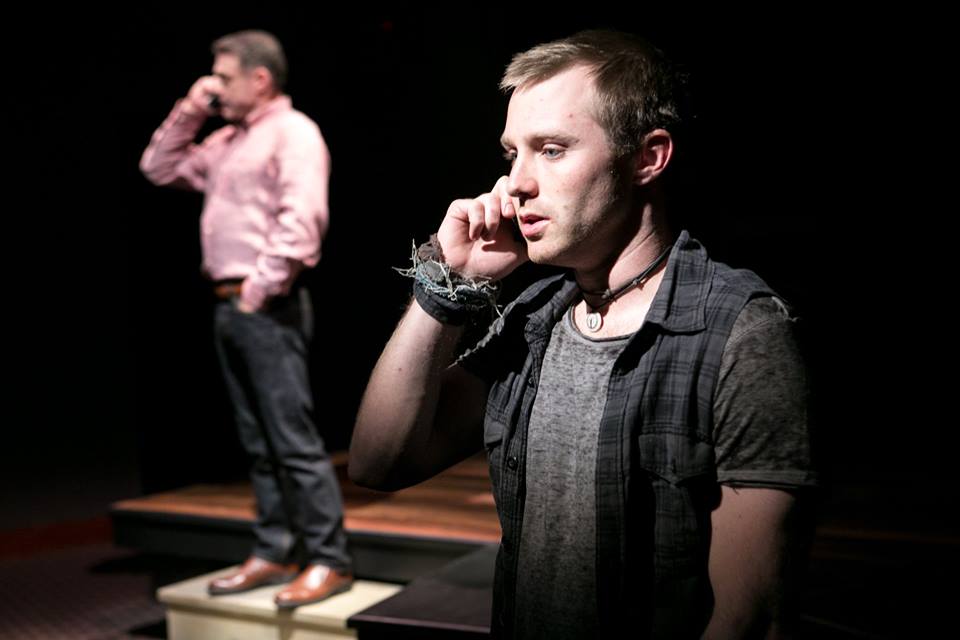
Gus
is announcing his imminent suicide to his children: Maria Teresa (Susan
Rome), nicknamed “Empty” after her initials, a labor lawyer as
impassioned and rabble-rousing as her Pop; Pill (Lou Liberatore), a
high school history teacher drawn to risky sexual encounters; and Vito
(Tim Getman), the youngest and the only avowed capitalist of the group.
They
don’t take it well, naturally, and rage, rage against the dying of the
light. But Gus insists he’s finished with life and has the beginning of
Alzheimer’s. More than that, Gus feels that what he believed in, what
he dedicated his life to, isn’t valued anymore and therefore, he’s
about as relevant as an old Bolshevik muttering in his tea about the
good old days of 1917.
He’s
demoralized by what he sees—the shrinking of the working class and the
rise of manipulators of private equity—and he wants out.
It’s
not so cut-and-dried for Gus’ children. They have complicated lives and
complicated feelings towards their father. It’s like a “des, dems and
dos” variation on The Cherry Orchard with a modern sensibility toward
sexuality. Empty swears she’s a lesbian but enjoys loud sex with her
ex-husband Adam (James Whalen) while awaiting the birth of her child
with partner Maeve (Lisa Hodsoll), who just happens to have been
impregnated with Vito’s sperm.
Pill
is married to theology professor Paul (Michael Anthony Williams), but
fooling around with a quirky, seductive hustler Eli (Josh Adams), and
admits that he prefers paying for sex and casual encounters to
commitment.
And
did we mention Clio (Rena Cherry Brown), Gus’ sister, a woman of
few—but well-chosen—words who is an ex-nun who ran off to join the
Shining Path?
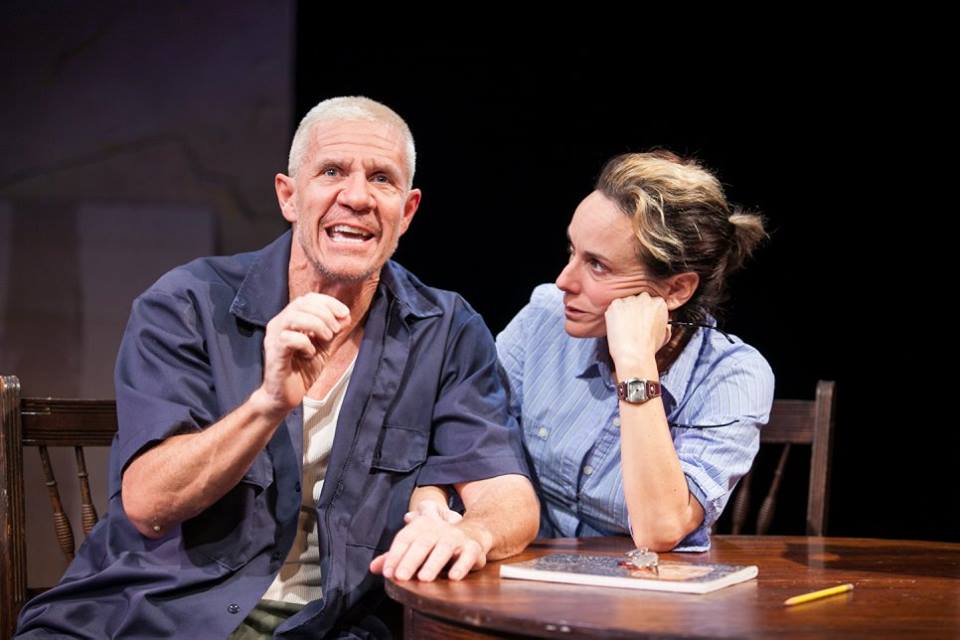 In this talkier version of ‘Night Mother, the clan
tries to talk Gus out of suicide while going off on tangents about
their own problems. Echoes of Odets, Miller and Shaw are seen in the
characters’ penchant for lofty ideological debate in a humble,
kitchen-sink setting. This all adds texture but seems rather weird that
everyone’s so verbose and prone to digression in the midst of what
appears to be an emergency—Dad’s gonna kill himself, for heaven’s sake.
Shut your pie hole. In this talkier version of ‘Night Mother, the clan
tries to talk Gus out of suicide while going off on tangents about
their own problems. Echoes of Odets, Miller and Shaw are seen in the
characters’ penchant for lofty ideological debate in a humble,
kitchen-sink setting. This all adds texture but seems rather weird that
everyone’s so verbose and prone to digression in the midst of what
appears to be an emergency—Dad’s gonna kill himself, for heaven’s sake.
Shut your pie hole.
The
conversations overlap, vie for supremacy and build to cacophonous
crescendos like an opera finale, a rich counterpoint to the working
stiff ethos of the play. There is also something grand about the
acting, thunderous and carved as if these are characters written for
the ages.
Susan
Rome seems like she just stepped out of a Thomas Hart Benton mural, so
sharply etched, firm and fierce is her portrayal of Daddy’s girl Empty.
Tim Getman is all bluff and brio as the misunderstood baby of the
family, Vito, while Lou Liberatore is a seething mass of contradictions
as the not-grown up middle-aged man Pill. Josh Adams never fails to
give an unexpected twist to his lines and depiction of the
tried-and-true role of the pretty, young gay hustler Eli. Similarly,
Rena Cherry Brown’s unusual line readings and timing make sister Clio
both a model of serenity and an unexpected source of humor.
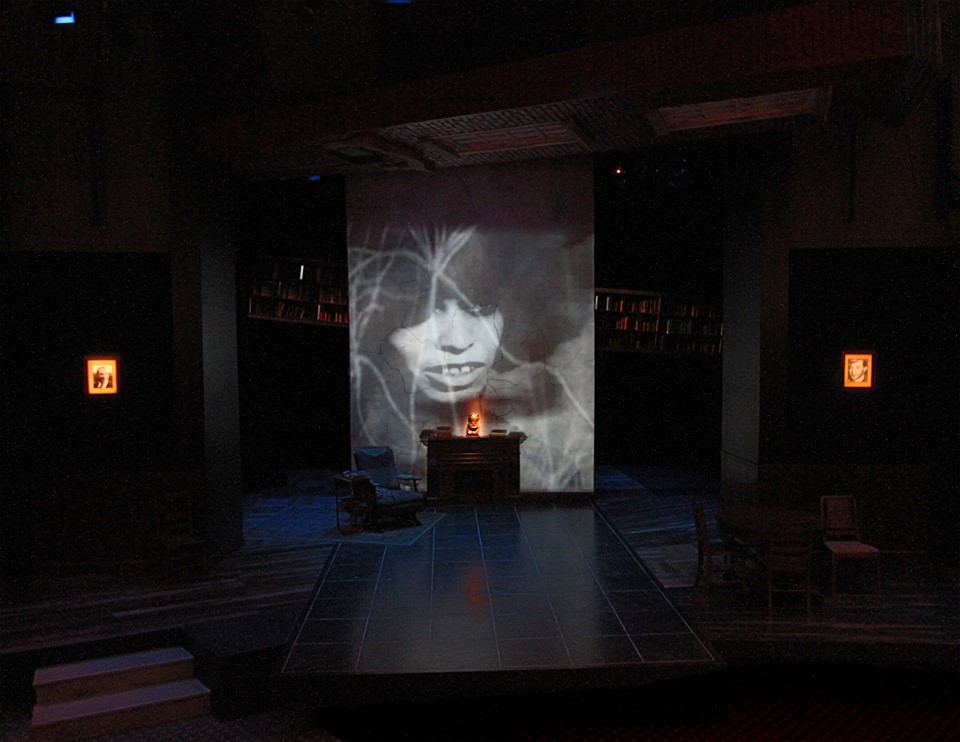
As the family
patriarch, Tom Wiggin gives a staggering performance as a lifelong
tough guy and leftie who bears the weight of his realization that the
labor movement didn’t fail him but the other way around. His Gus is a
hero in the truest sense—strong, deeply flawed, and a man of his word.
Speaking
of words, there are acres of them in The Intelligent Homosexual’s Guide
and references to everything from Garibaldi to the Desert Fathers.
There’s no way you can keep up with Kushner’s opulent mind and you’re
probably not supposed to—just let the language wash over you.
But
you still may wonder—what does it all mean? Could be a lot of
delectably perfumed hot air, for all we know. That doesn’t necessarily
detract from your enjoyment of Kushner’s sprawling, ambitious work that
forces us to think once again about class struggles and the power of
the people.
Review
by Jayne Blanchard
|
Kushner’s
‘Guide’: Long, gabby and intelligent
The Washington Post
Review
by Peter Marks
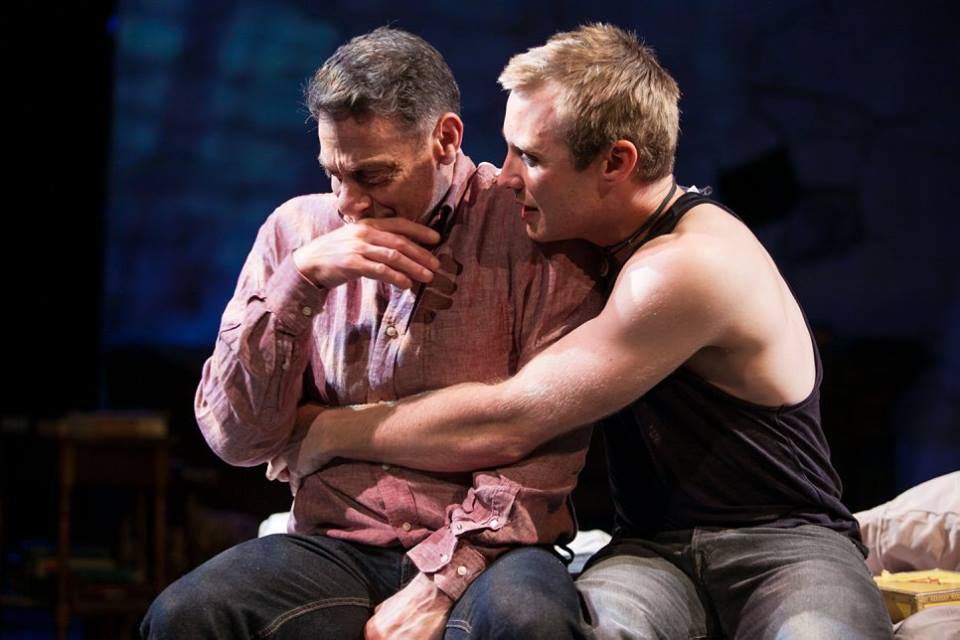 It’s
been perilously gusty this week outside the confines of Theater J
— and within. A great torrent of words is whooshing across the
company’s stage, courtesy of Tony Kushner and his garrulous,
passionate, digressive, erudite, funny, caustic, unwieldy, instructive,
didactic and sharp-elbowed comedy-drama, with its space-suck of a title. It’s
been perilously gusty this week outside the confines of Theater J
— and within. A great torrent of words is whooshing across the
company’s stage, courtesy of Tony Kushner and his garrulous,
passionate, digressive, erudite, funny, caustic, unwieldy, instructive,
didactic and sharp-elbowed comedy-drama, with its space-suck of a title.
Like the play itself, its name — “The Intelligent Homosexual’s Guide to
Capitalism and Socialism with a Key to the Scriptures” — chafes against
the ceiling of our need for information. There’s a lot to process in
this 3 1/2 -hour play, focused mostly on the death wish of a retired
Brooklyn longshoreman and union organizer, an idealist who has become
terminally disenchanted with the state of everything: the labor
movement, the socialist left, the “system,” his three fallible grown
children.
And yet, this being Kushner, American theater’s foremost opus-weaver
(“Angels in America,” “Homebody/Kabul”), the play is engaging in a
sprawling, untamed way — a messy mosaic, encrusted with gems; not his
strongest piece, but as is always the case with this dramatist, a
lively play packed with reasons to listen, even when it’s not
easy-listenin’. At times, in fact, in director John Vreeke’s polished
production, the arguing becomes so intense that it erupts all over the
stage at once, with characters shouting at one another in competing
clusters — another combustible Babel.
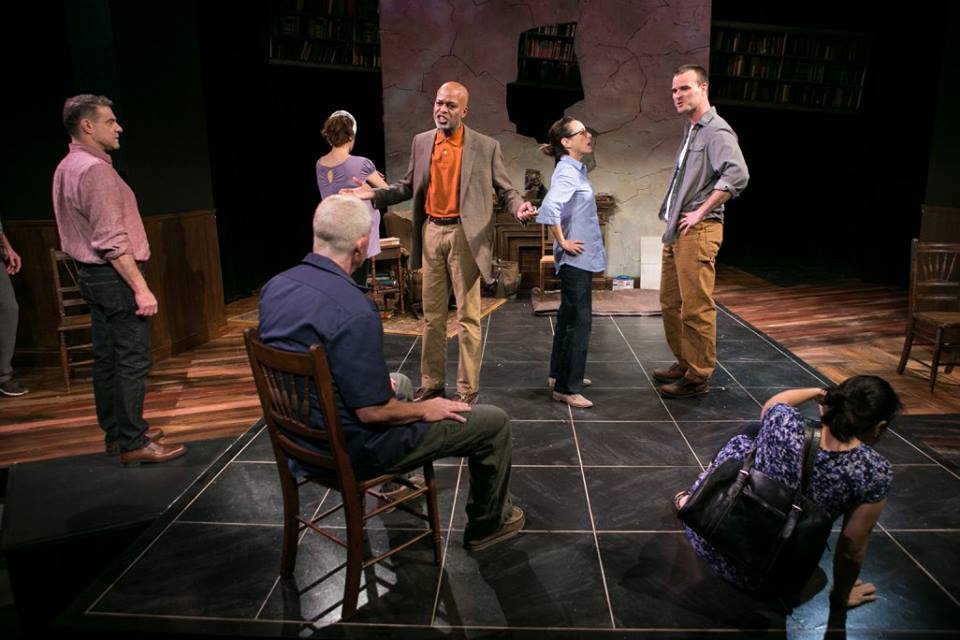 Distinguishing
the voices in these interludes is sometimes as
challenging for an audience member in the Goldman Theater as the larger
task Kushner sets for us, understanding where this “Guide” is meant to
take us. The battles across emotional, ideological, even theological
lines — two of the 11 characters are religious scholars — rage in every
direction, to an arcane extreme. How many plays, after all, include a
consideration of the biblical issue of dispensationalism? Distinguishing
the voices in these interludes is sometimes as
challenging for an audience member in the Goldman Theater as the larger
task Kushner sets for us, understanding where this “Guide” is meant to
take us. The battles across emotional, ideological, even theological
lines — two of the 11 characters are religious scholars — rage in every
direction, to an arcane extreme. How many plays, after all, include a
consideration of the biblical issue of dispensationalism?
For all the angry, elevated cross-talk, however, “The Intelligent
Homosexual’s Guide” returns over and over to one organizing and
digestible theme, the fissures in the family of the old longshoreman,
Gus Marcantonio (the ruggedly empathetic Tom Wiggin), and more
specifically the question of why, in the face of the family’s anguish,
he is determined to kill himself.
Kushner gives Gus a speech, well more than three hours into the
play,
in which he finally spells out his rationale for checking out. It’s a
bit of a letdown, a spleen-venting that you imagine could easily have
come way earlier and got us all home at a decent hour. Then again, “The
Intelligent Homosexual’s Guide” attempts to embody as well as
illuminate a paralysis that is overtaking Gus’s children and the
society at large, a slow-moving, money-fed decay that is neutralizing
dissent, neutering the environment and smothering the working class.
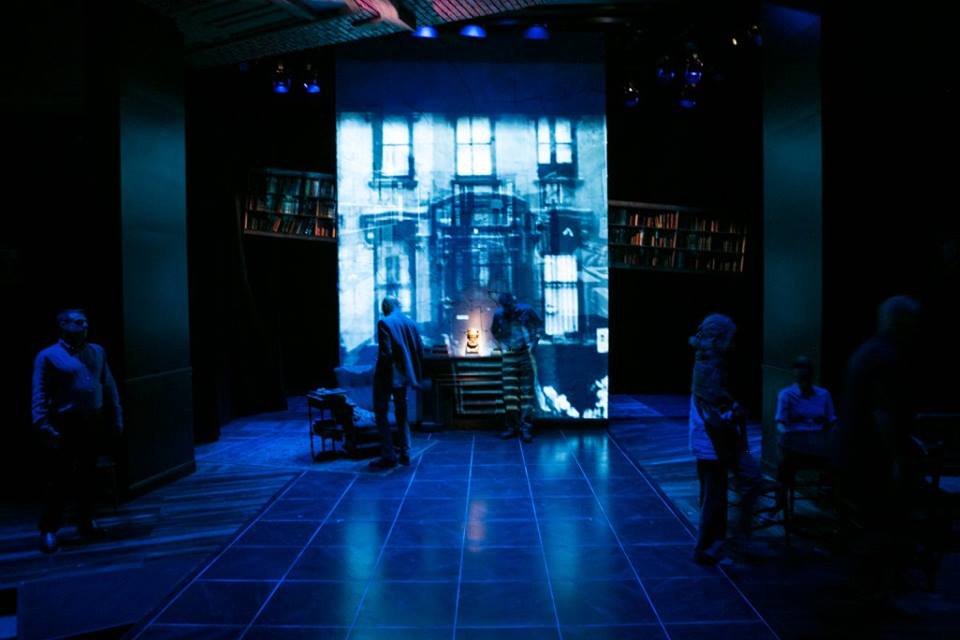 What
alerts everyone to Gus’s seriousness about suicide — he has
slashed his wrists once before — is that he’s put up for sale the
brownstone that’s been in the family for generations. (The play is set
in 2007, on the cusp of the country’s close-to-apocalyptic financial
meltdown.) Gus’s kids, nursing their own psychic wounds, view the
impending transaction not as a personal windfall but as a cataclysmic
surrender: PierLuigi, or “Pill,” played by the excellent Lou
Liberatore, is a history teacher married to theologist Paul (Michael
Anthony Williams) but in love with sensitive young hustler Eli (Josh
Adams); Maria Teresa, or “Empty,” portrayed by the equally terrific
Susan Rome, is a nurse-turned-labor-lawyer who has left Adam (James
Whalen) for the now-pregnant Maeve (Lisa Hodsoll); and Vito (Getman, in
another impressive turn), a contractor married to Sooze (Sue Jin Song)
and who has donated his sperm to Maeve and Empty. What
alerts everyone to Gus’s seriousness about suicide — he has
slashed his wrists once before — is that he’s put up for sale the
brownstone that’s been in the family for generations. (The play is set
in 2007, on the cusp of the country’s close-to-apocalyptic financial
meltdown.) Gus’s kids, nursing their own psychic wounds, view the
impending transaction not as a personal windfall but as a cataclysmic
surrender: PierLuigi, or “Pill,” played by the excellent Lou
Liberatore, is a history teacher married to theologist Paul (Michael
Anthony Williams) but in love with sensitive young hustler Eli (Josh
Adams); Maria Teresa, or “Empty,” portrayed by the equally terrific
Susan Rome, is a nurse-turned-labor-lawyer who has left Adam (James
Whalen) for the now-pregnant Maeve (Lisa Hodsoll); and Vito (Getman, in
another impressive turn), a contractor married to Sooze (Sue Jin Song)
and who has donated his sperm to Maeve and Empty.
Got all that? For good measure, Gus has invited to
stay with him his
sister Clio (Rena Cherry Brown), a former nun whose political
radicalism led her to Peru and an absorption into the Maoists of the
Shining Path guerrilla movement.
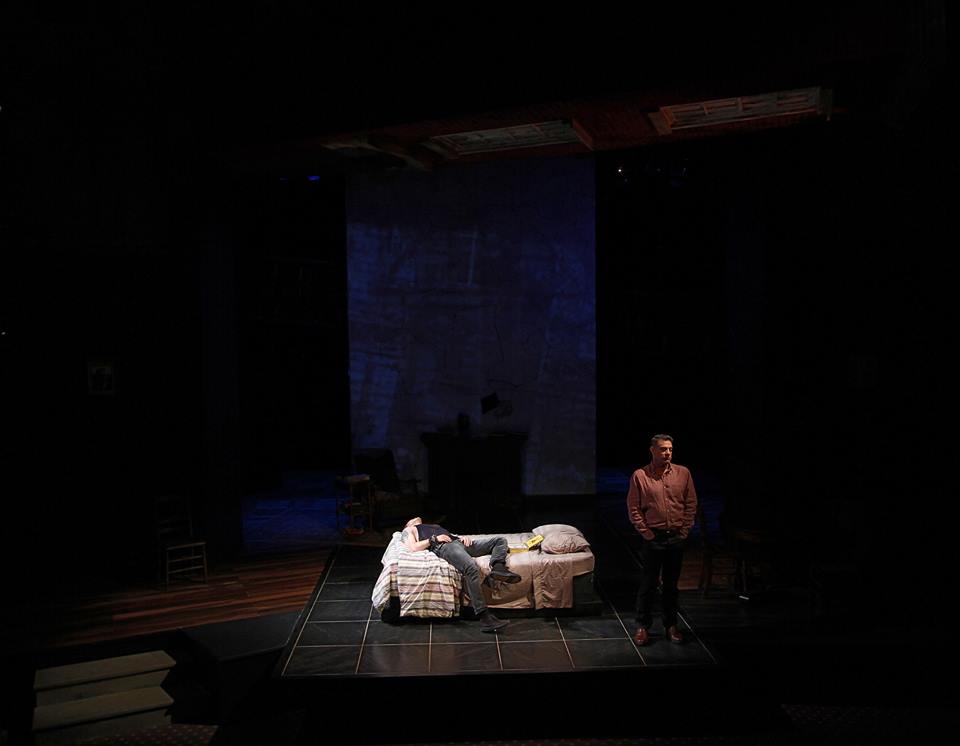 The
gallery of characters allows Kushner a
Chekhovian varnish: Rome’s
Empty even reminds the others, in imitation of a Chekhov heroine, that
it is important that they keep on working. And the marathon length of
the play gives many of the actors their own opportunities to forge
shining paths: Hodsoll is particularly good as the loud and histrionic
Maeve; Brown makes for a fine, vinegary Clio; and Adams persuasively
conveys the jumble of conflicting impulses that are Eli, a Yale alum
who graduates to turning tricks. The
gallery of characters allows Kushner a
Chekhovian varnish: Rome’s
Empty even reminds the others, in imitation of a Chekhov heroine, that
it is important that they keep on working. And the marathon length of
the play gives many of the actors their own opportunities to forge
shining paths: Hodsoll is particularly good as the loud and histrionic
Maeve; Brown makes for a fine, vinegary Clio; and Adams persuasively
conveys the jumble of conflicting impulses that are Eli, a Yale alum
who graduates to turning tricks.
It’s
easy enough to point out that there’s material here for at least
three plays: the concerns of “The Intelligent Homosexual’s Guide” cover
everything from labor-union featherbedding to Catholic mendicant orders
to the state of gay marriage. But connecting all the narrative dots
might not be the best use of one’s first exposure to the play. Better
to focus your attention on Gus, who in Wiggin’s grounded and searching
performance, provides the evening with a useful touchstone. Like the
play, he talks and talks but is rarely dull.
Review
by Peter Marks
|
This show
is
a surfeit of surprise and substance, of significance and delight, of
density and shimmering wit. And the long and the short of it is…don’t
miss it.
"All
the stage arts perfectly serve Kushner’s extraordinary script and
Vreeke’s focused conception."
DC
Metro Theatre Arts
Review by John Stoltenberg
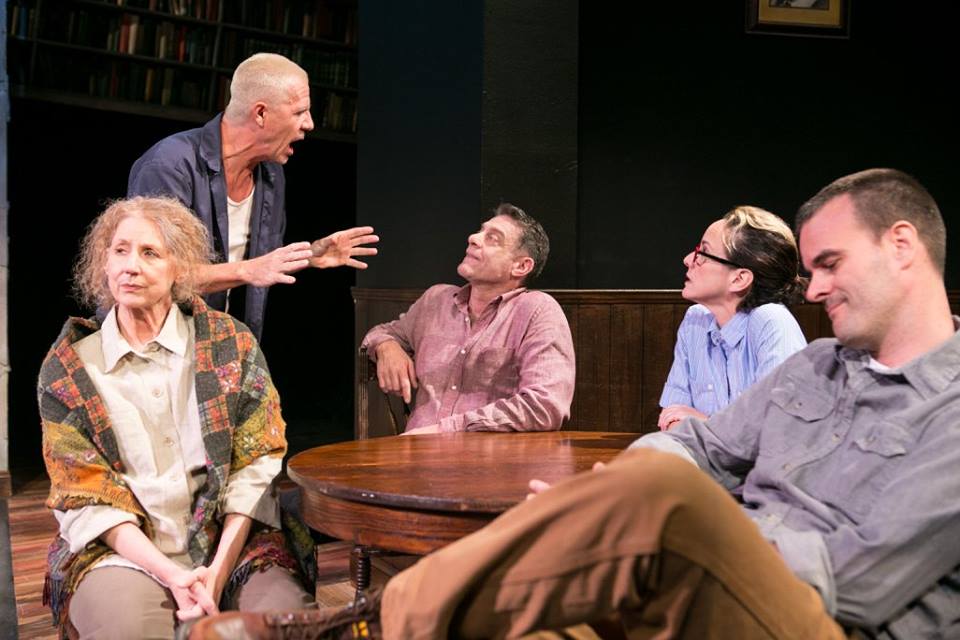 Kushner’s story centers on an
Italian-American family in Brooklyn with
radical intellection in its blood. It’s one of those homes where talk
overlaps constantly and opinions ping-pong and agile vocabularies are
obligatory; and though other people come and go, their brains all seem
networked to the same cognitive cloud. That, of course, would be the
prodigious mind of Kushner. The upshot is that drop-in visitors such as
ourselves, inquisitive theatergoers, cannot help but be amused and
amazed. Even if we don’t catch it all, there’s more than plenty to
entertain us. And as we listen in on the brilliant badinage, our own
mental faculties are quickened. Kushner’s story centers on an
Italian-American family in Brooklyn with
radical intellection in its blood. It’s one of those homes where talk
overlaps constantly and opinions ping-pong and agile vocabularies are
obligatory; and though other people come and go, their brains all seem
networked to the same cognitive cloud. That, of course, would be the
prodigious mind of Kushner. The upshot is that drop-in visitors such as
ourselves, inquisitive theatergoers, cannot help but be amused and
amazed. Even if we don’t catch it all, there’s more than plenty to
entertain us. And as we listen in on the brilliant badinage, our own
mental faculties are quickened.
The
genius of Kushner’s writing in The Intelligent Homosexual’s Guide…
is that it activates in its audience the very attentiveness it wants
and needs us to have in order to tune in to what it says and means—a
mentally transformative experience unlike most any other in live
theater. What lies in store for the rapt receiver is a story with such
a broadband of resonance you’d have to combine Chekhov and Shaw with a
soupçon of Simon to come up with anything close.
On
one level iHo centers on Gus, the widowed 72-year-old father of two
sons, one gay and one straight, and a daughter, who is divorced from a
man and in a lesbian relationship. Gus owns the $4 million brownstone
where much of the play takes place. Gus has announced his intention to
commit suicide, and his three children, who have their own dramas going
on, are determined to change his mind. We know Gus means business
because he’s already made a serious attempt. A former longshoreman and
labor union organizer, he has become disillusioned with life, not in a
morose and depressed way but in an insightful and astute way: The
anticapitalist revolution he wanted to happen, and worked so hard to
help incite, has not come to pass. Worse, he says, the world is dying
because money has become truth.
 There’s a bit of an
implausibility about Gus: If he’s so smart, why
can’t he think himself out of checking out? Well, just because, really.
Besides, in Tom Wiggin’s compelling and persuasive performance, Gus’s
idée fix propels interconnecting storylines that are as lively
and fun to follow as they are dead serious. There’s a bit of an
implausibility about Gus: If he’s so smart, why
can’t he think himself out of checking out? Well, just because, really.
Besides, in Tom Wiggin’s compelling and persuasive performance, Gus’s
idée fix propels interconnecting storylines that are as lively
and fun to follow as they are dead serious.
The
big ideas packed into iHo are about money, class, labor, property,
the worth of work, the value of a human life—all loaded concepts in
socialist and anticapitalist discourse—as well as about faith, the
soul, God, and other spiritual concepts from religious traditions and
theological study. Though Kushner’s full title seems an almost mocking
amalgam of Marxist and religious frames of thought, it turns out he
really does use both languages to dramatize and express his themes.
Plus he throws in a lot of laughs and sex.
When
the play begins, Gus’s gay son, known as Pill (the engagingly
earnest Lou Liberatore), is on the phone with a hot but dim hustler,
Eli (the appealingly ardent Josh Adams). We learn there’s an intense
connection of eroticism and commerce between them, not to mention
multiple betrayals—including of Pill’s husband, Paul—and as their
complex sex-for-sale relationship evolves over the course of the play,
Kushner glosses it with some of the play’s most eyeopening observations
about the deleterious effect of money on human life and relations.
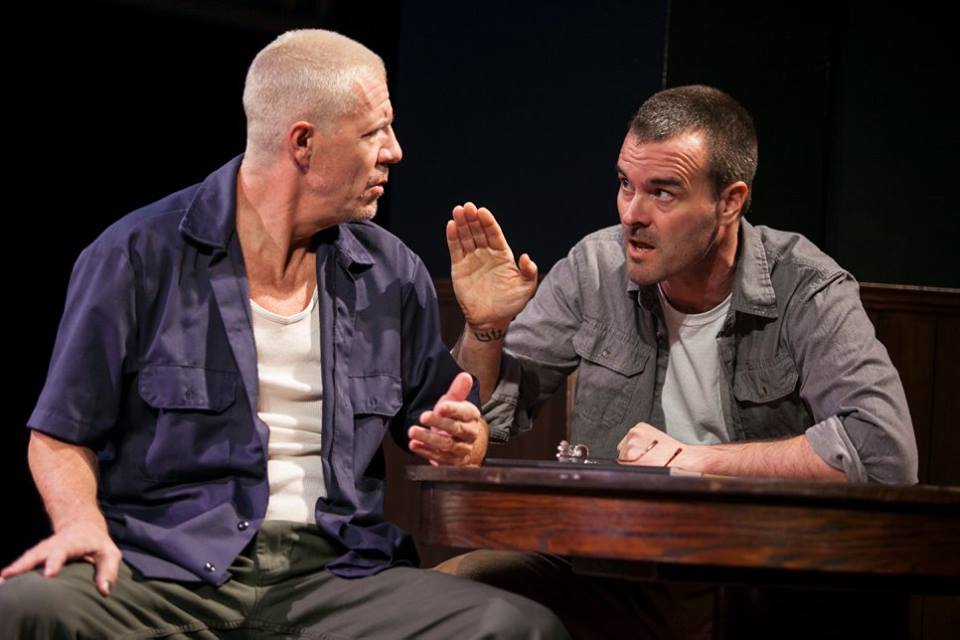
Similarly
Kushner extracts from the narrative of Gus’s suicide planning
a potent metaphor for the anathema of property. Unbeknownst to his
kids, Gus has found a buyer for the brownstone. He intends to sell it
before he kills himself so the money can be divided among the siblings,
a notion that distresses and appalls them. The house hangs over their
lives not only figuratively; Production Designer Misha Kachman has
cleverly suspended over the stage a red brick brownstone facade that
does so literally.
Money,
property, and labor are also viewed through Kushner’s witty lens
in the subplot of Gus’ daughter, called Empty (the energetic Susan
Rome), whose very pregnant same-sex partner, Maeve (the droll Lisa
Hodsoll), is about to give birth to the child they planned. Empty and
Maeve’s relationship is on the rocks, however, again with multiple
betrayals. Empty has sex with her ex, Adam (the slick James Whalen), a
real estate agent who brokered the sale of the brownstone. The sperm
for the baby did not come from a bank as planned because Pill borrowed
the money they’d saved up to do that and spent it all on his young
hustler. So Maeve used sperm from Empty and Pill’s brother, Vito (the
stolid Tim Getman), making her pregnant with her own nephew but locking
the baby into an inheritance claim. Sooze (the flighty Sue Jin Song),
Vic’s wife, shows up. When she learns Vic delivered the semen to Maeve
not as a hand job but in situ, she freaks. Thus does Kushner
hilariously and provocatively weight Maeve’s impending labor with
impropriety and property, monkeying around and money.
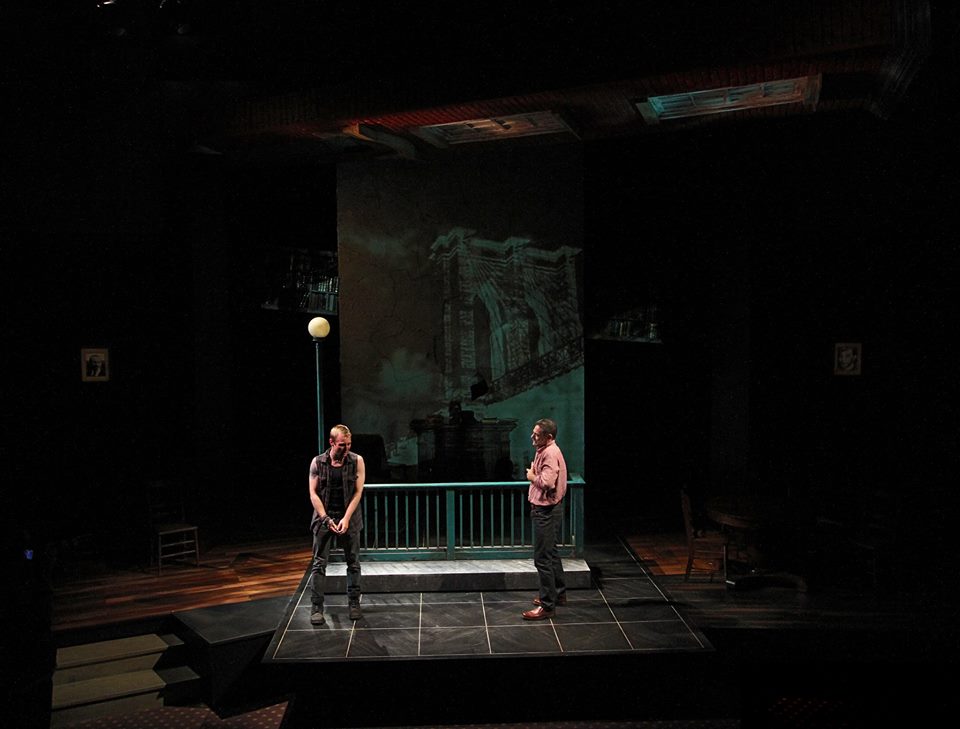
Meanwhile
three of the characters extemporize in religious language.
Paul (Michael Anthony Williams) is a lecturer in theology, Maeve is a
doctor of theology, and Gus’s sister, Zeeko (Rena Cherry Brown), is a
former nun. And a character who arrives late in the play, Shelle
(Jenifer Belle Deal), brings a loving, personal, and profoundly moving
dimension to all the talk of the value of life.
All
the stage arts perfectly serve Kushner’s extraordinary script and
Vreeke’s focused conception. We are ushered into the
philosophical/political landscape of the play by a fascinating montage
of images and audio evoking U.S. and European political protest,
demonstrations, communist and socialist leaders and mass actions—all by
Projections Designer Jared Mezzocchi and Composer/Sound Designer Eric
Shimelonis. Similar effects, including by Lighting Designer Dan Covey,
mark the play’s passage in time and place and bracket the play’s
scenes. While Kachman has framed the realistically furnished playing
areas with dramatic abstraction—a wide bookcase suspended askew, a vast
cracked wall upstage, that hovering building facade—Costume Designer
Ivania Stack has given the characters an unobtrusive commonality of
credibility.
Any
“intelligent theatergoer’s guide” to The Intelligent Homosexual’s
Guide… ought to advise that there’s too much relational, emotional, and
ideational content here to be appreciated and assimilated in one
sitting. And the play lets you know right away that’s perfectly fine.
There’s a lot of scintillating and quippy philosophizing, and the play
moves at a brisk clip, but every plot point is unmissable and every
character arc unmistakable. Whether you take a deep breath and call it
The Intelligent Homosexual’s Guide to Capitalism and Socialism With a
Key to the Scriptures or whether you breezily call it iHo, this show is
a surfeit of surprise and substance, of significance and delight, of
density and shimmering wit. And the long and the short of it is…don’t
miss it.
Review
by John Stoltenberg
|
Theatre J's Wild, Rollicking INTELLIGENT
HOMOSEXUAL'S GUIDE
"Director John Vreeke has pulled off an incredible artistic feat"
BroadwayWorld.com
Review
by Andrew White
It's
a given that whenever Tony Kushner touches down on the DC stage, it's a
major cultural event. But the current production of The Intelligent
Homosexual's Guide to Capitalism and Socialism with a Key to the
Scriptures comes complete with quirks and brainy asides that can leave
audiences miles behind, grasping for meaning. This being an epic
affair, clocking in at over 3 ½ hours, eventually we simply give
up and let the characters live their lives, untouched and untouchable.
But that's when the magic starts.
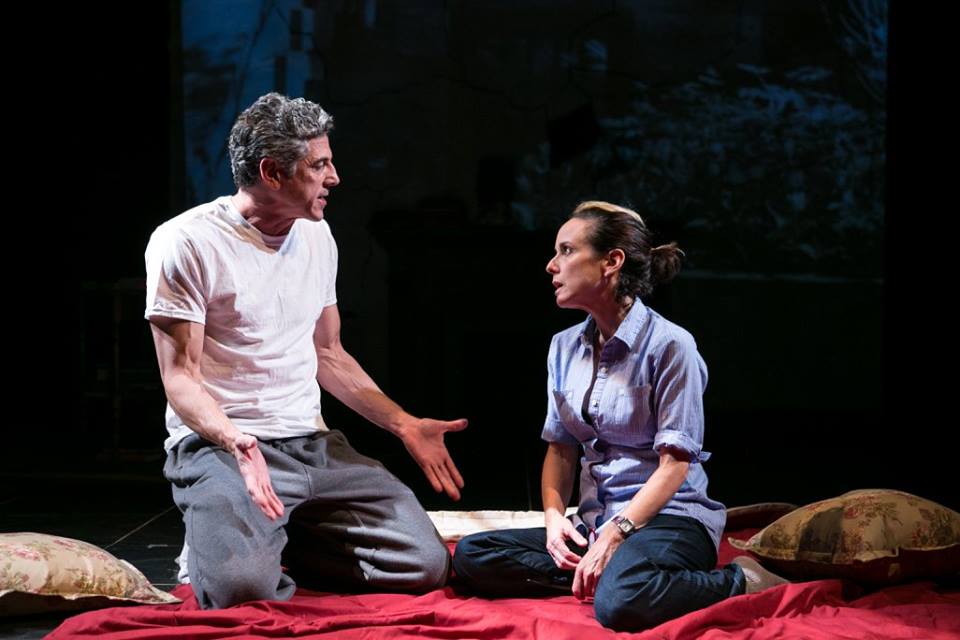 Although
Kushner has proven so masterful at creating intricate but
solidly-constructed plots-and who can forget his work on the screenplay
for Steven Spielberg's Lincoln-it would appear that he has ditched plot
and lines of development completely. I get the impression that his
research for Intelligent Homosexual's Guide consisted of reading James
Joyce's impenetrable Finnegan's Wake while listening to a Mozart opera
or two. Joyce's last novel is notorious for its idiosyncratic
references to a bewildering variety of historic and contemporary
phenomena (not too long ago, you could get tenure just trying to
explain 20 pages of it), while Mozart popularized the trick of having
his characters singing diverse lyrics and melodies simultaneously,
constantly weaving around each other. Although
Kushner has proven so masterful at creating intricate but
solidly-constructed plots-and who can forget his work on the screenplay
for Steven Spielberg's Lincoln-it would appear that he has ditched plot
and lines of development completely. I get the impression that his
research for Intelligent Homosexual's Guide consisted of reading James
Joyce's impenetrable Finnegan's Wake while listening to a Mozart opera
or two. Joyce's last novel is notorious for its idiosyncratic
references to a bewildering variety of historic and contemporary
phenomena (not too long ago, you could get tenure just trying to
explain 20 pages of it), while Mozart popularized the trick of having
his characters singing diverse lyrics and melodies simultaneously,
constantly weaving around each other.
The
premise for this exercise in madness is straightforward enough: Gus, a
long-retired longshoreman, union organizer and unrepentant Communist,
is contemplating suicide-ostensibly because his memory is starting to
fail him, which he takes to be a sign of Alzheimer's. Over the course
of the play, however, it becomes obvious that there are many other
reasons why suicide might be a preferable option; the disintegration of
Communism into consumerism, the disintegration of each of his
children's lives into chaos and infidelity, and then there's that
insanely high offer for his family home, a brownstone, a sum that even
jaded DC audiences might find excessive. The prospect of leaving that
much money to his kids, before the market tanks (the play is set in
2007) is a huge temptation. The dialogue is sprinkled liberally with
Kushner's obsessions du jour; theology, Communism, G. B. Shaw, lesbian
sex, artificial insemination, and drywall repair to name just a few.
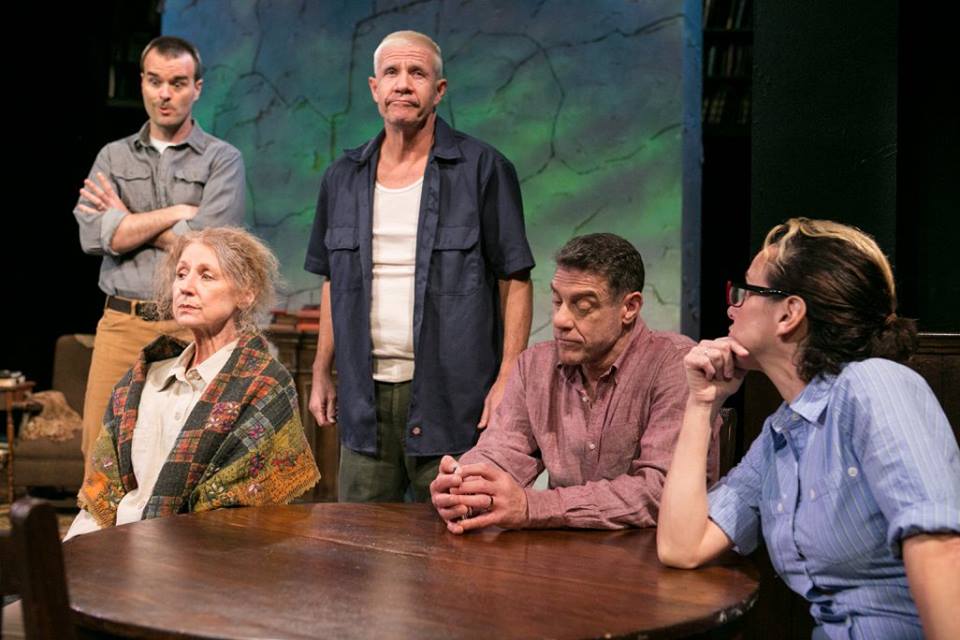
Director
John Vreeke has pulled off an incredible artistic feat, honing his
ensemble into a small chamber orchestra because that is what Kushner
requires; a cast capable of performing precision-timed simultaneous
dialogues while pausing just long enough for a lone interjection to
bring down the house with laughter. Tom Wiggin anchors the proceedings
as a gruff, plainspoken patriarch Gus; in spite of his resolve to die
soon, he ends up being the calm at the center of the storm that is his
family. As his sister Zeeko, Rena Cherry Brown shares his sanguine
attitude towards everyone else's troubles; in a typical move, Kushner
gives Zeeko a biography that begins in a Carmelite convent, proceeds
directly to the Shining Path, and we even see her leafing through the
works of Mary Baker Eddy (whose book Science and Health with Key to the
Scriptures gets a nod in the play's title). Ms. Brown, always a
graceful presence, bears Zeeko's world-weariness lightly, and glows
throughout.
The
children are not necessarily given equal prominence, but there are some
excellent performances here as well: Lou Liberatore is a standout as
Pill, Gus's gay son, who is clearly at a crossroads in his personal
life; his panic, mingled with his desire to keep his father alive, are
positively riveting. As his husband Paul, Michael Anthony Williams
provides an element of gravitas and conscience that is the Ying to
Pill's Yang (Paul being a theology professor, perhaps this comes with
the territory). Pill's sister Empty-the nicknames are based on their
Italian names, by the way-is a chip off the old block, having followed
her father Gus into labor advocacy as a lawyer, and Susan Rome nails
this role, which is often the most compelling. Rounding out the house
is Vic or "V", Gus's straight son and unlike everyone else an actual
working man, whose drywall skills come in especially handy during the
show. Tim Getman does a good job with a role that is somewhat
underwritten, although his character's secrets make for some real
complications.
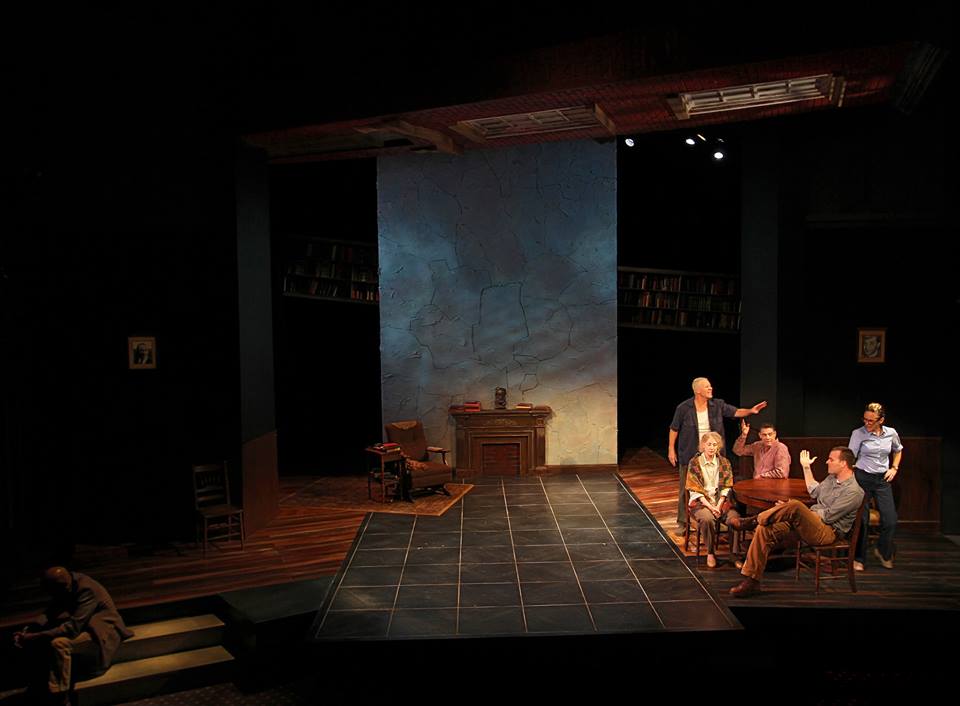 There is, of course,
collateral damage in the form of spouses and lovers, and perhaps the
most memorable here are Josh Adams as Eli, a Hustler (and a Yalie) who
is the apple of Pilll's eye and Lisa Hodsoll as Maeve, Empty's wife and
the expectant mother of their first baby. (Now, there hangs a tall tale
...). James Whalen is an appropriately hunky Adam, Empty's ex-husband,
and Jenifer Belle Deal gives a gentle and disturbing performance as
Michelle, a widow who brings Gus his suicide kit. There is, of course,
collateral damage in the form of spouses and lovers, and perhaps the
most memorable here are Josh Adams as Eli, a Hustler (and a Yalie) who
is the apple of Pilll's eye and Lisa Hodsoll as Maeve, Empty's wife and
the expectant mother of their first baby. (Now, there hangs a tall tale
...). James Whalen is an appropriately hunky Adam, Empty's ex-husband,
and Jenifer Belle Deal gives a gentle and disturbing performance as
Michelle, a widow who brings Gus his suicide kit.
Misha
Kachman has created an appropriately surreal set, complete with a
2-story wall, with brick and windows, suspended over the stage and a
distressed wall on which period films are projected. Jared Mezzocchi's
montage of Cold War imagery, from pop stars to Stalin, helps to create
the appropriate mixture of nostalgia and confusion that fits the script
to a "t".
Given
the fact that the dialogue is all over the map, it is tempting to say
that Kushner is beginning to experiment with a new style he hasn't
quite found yet. The play works brilliantly as a performance piece, and
this ensemble is nearly perfect; but his decision to leave things up in
the air (per Kachman's design) seems to indicate that he himself is on
the cusp of something new. Normally I'm not one to kibitz, but one
avenue he might try is to ditch his constant recourse to the crotch and
its foibles as a plot device. Marital Infidelity and explicit
references to various sex acts may get a rise out of some theatregoers,
but frankly it's old hat. And as Gus himself says when Empty starts to
talk dirty, you trivialize yourself when you do it.
Review
by Andrew White
|
"There’s
something timeless about the work of Kushner, brought to us in
this stirring production, creating something that will stay with us."
"Credit
director John Vreeke for keeping this triple-trailer semi truck
on course. Good thing for him he’s working with a first class cast."
Review
by Roger Catlin
MD
Theatre Guide
When
the Theater J production of Tony Kushner’s The Intelligent Homosexual’s
Guide to Capitalism and Socialism with a Key to the Scriptures still
hadn’t begun a little after its posted starting time one night this
week, I had a dark thought: Kushner’s backstage rewriting it again!
 That
was practically the situation when the mammoth work — his most recent
for the stage — first premiered at the Guthrie Theatre in Minneapolis
in 2011. Kushner is a brainy, passionate and very funny writer whose
“Angels in America” had earned him a Pulitzer and a reputation. And
here he seemed to be throwing every last idea he had into a 3 1/2 hour
production. That
was practically the situation when the mammoth work — his most recent
for the stage — first premiered at the Guthrie Theatre in Minneapolis
in 2011. Kushner is a brainy, passionate and very funny writer whose
“Angels in America” had earned him a Pulitzer and a reputation. And
here he seemed to be throwing every last idea he had into a 3 1/2 hour
production.
Kushner
was in D.C. for rehearsals of its D.C. premiere — and only its fourth
staging overall. But by now the work, while still unpublished, has
attained a heft and solidity of a major theatrical event. Those worried
about its length (or troublesome course up to now) should know that it
needs the time for all of the humor, pain, unexpected pathos, and
history of the demise of the American labor movement he wants to
include.
Kushner
has so much to say about all of these things that there are points
where the dialogue literally overlaps — with two or three conversations
happening simultaneously. Crazy, for theater; but lifelike, you have to
admit.
And
by the time the second intermission comes, about the time when people
would usually be shuffling to the parking lot, the audience is so
riveted at what’s going on, they wouldn’t think of leaving, let alone
dashing to the restroom, lest they miss its resumption.
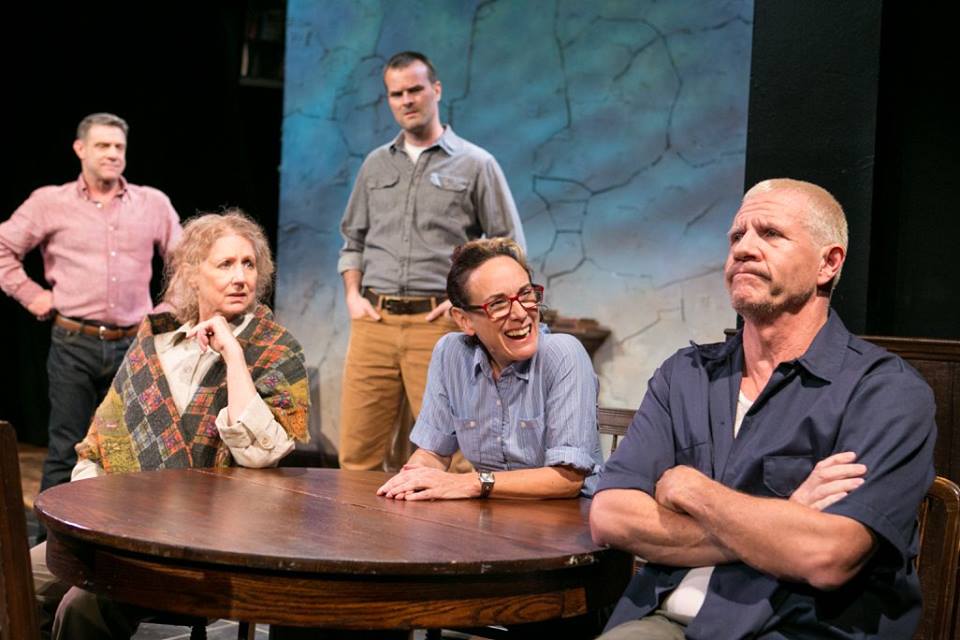
Kushner
spends a lot of time these days on screenplays and a series for HBO,
which is a shame since iHo, as he likes to call it, is so full of
theatrical mastery — of characters, of tension, of uproarious humor and
keen wit, of unexpected visual spectacle and a mysterious suitcase; of
life and death and love and the panorama of ideas, history and thought,
presented by a writer who refuses to talk down to his audience (or even
look at his watch as the pages pile up).
Most
of all, Kushner is doing what the central character exclaims at a key
moment: “I’m still thinking.”
And what a wonderful
thing that is.
For
all of that, there are still traces of what an unfinished thing it must
have been in its premiere. “Any good theater in Minneapolis?” is the
first line, a throwaway reference to the initial high anticipation for
the work.
Another
bit about cell phones in theaters has rarely been so strongly addressed
in the body of a play, only to pay off hilariously later.
Credit
director John Vreeke for keeping this triple-trailer semi truck on
course. Good thing for him he’s working with a first class cast.
 Tom Wiggin brings a
growling contentiousness as Gus, a still quite vital 72-year-old former
longshoreman and union organizer, whose attempts at suicide has brought
the concern of his three adult children, each of whom have their own
issues. Tom Wiggin brings a
growling contentiousness as Gus, a still quite vital 72-year-old former
longshoreman and union organizer, whose attempts at suicide has brought
the concern of his three adult children, each of whom have their own
issues.
Gus
is a throwback not just because he’s a labor guy and former party
member; he’s a working class scholar, busying himself by translating
Horace.
Susan
Rome is very good as the daughter who gave up a medical career for
socially engaged one; her partner (Lisa Hodsoll) is a doctor of
theology who is about to give birth.
Lou
Liberatore is a high school teacher with a husband (and former theology
teacher of the above partner) (Michael Anthony Williams), caught up in
a relationship with a young hustler (Josh Adams).
Tom
Getman plays the straight offspring, a contractor with anger issues and
a wife (Sue Jin Song) who tries to smooth things over.
In
the background (at least in the start) is Gus’ sister, played by Rena
Cherry Brown, with a sour look on her face, the perfect deadpan for the
action all around her. Though she’s had a radical background as well,
she has lately turned to Mary Baker Eddy (who provides the second half
of the title; the first is from the title of a political tract by
George Bernard Shaw).

Jennifer
Belle Deal has a startling role late in the play, as someone who dryly
explains the methods of suicide — a scene as tense and serious as
others are boisterous and chaotic – Marxist more in the sense of the
Brothers than the revolutionary philosopher.
The
action largely takes place inside the family brownstone in Brooklyn,
which may or may not be sold if Gus does the deed. The daughter’s ex
(James Whalen), a real estate lawyer, happens to live in the basement
and is ready to help with any sale.
Misha
Kachman’s set is a good place to spend a few hours; its overstuffed
bookcase denotes a life of reading (though it slants right instead of
left). The cracks in the walls above the fireplace would denote
fissures in the family as well, if they don’t crack open further when
the angry son throws the bust of Italian patriot Garibaldi into it. Her
brownstone facade floating ominously above them may be something you
don’t notice until two hours in because of all the action on stage.
The
projections and sound of Jared Mezzocchi and Eric Shimelonis,
respectively, perfectly frame the action and time.
But
there’s something timeless about the work of Kushner, brought to us in
this stirring production, creating something that will stay with us.
Review
by Roger Catlin
|
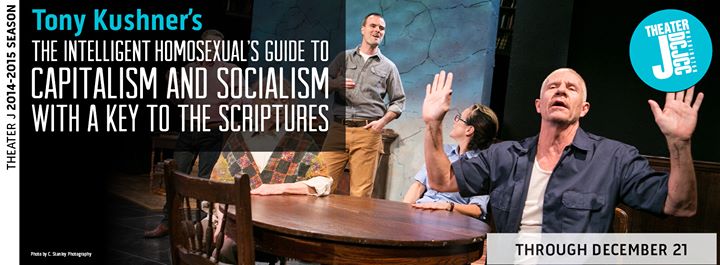
|
The Images:
|
The
Intelligent
Homosexual's
Guide
To Capitalism
and Socialism With
A Key To The Scriptures
Photo
credits: C. Stanley Photography
(Click
on photo to enlarge)
Interview:
John Vreeke on directing Intelligent
Homosexual’s Guide…
Interview
by Alan Katz
DC
Theatre Scene
When I first saw Theatre J’s season announcement, I knew I wanted to
talk with John Vreeke, director of Intelligent Homosexual’s Guide to
Capitalism and Socialism With a Key to the Scriptures, which is having
its area premiere at Theatre J. Luckily for us, he was able to pull
away from rehearsals for this 3.5 hour play to discuss the production’s
scale and how it fits into the DC theatre scene.
Alan Katz: First Question, who are you?
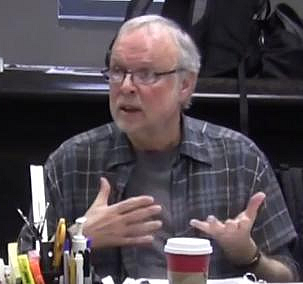 John Vreeke: I
think the best way to find out who I am is to check out my website and
see the kind of work I have done in DC over the past 15 years. It’s
quite a bit. And I direct plays, I guess that’s why you’re talking to
me. Beyond that, I live with my partner in Seattle, we’ve lived in West
Seattle since 1988 off and on, we own our house there. We moved to DC
in 2000, stayed for almost 10 years, then for a variety of reasons we
moved back. We love to explore the mountains, hike a lot and bike a
lot. I don’t do any theater in Seattle (not by choice!). But I like
what I do here; as long as these great Artistic Directors around DC
keep putting up with me, I’m glad to keep coming back and directing
some great plays. John Vreeke: I
think the best way to find out who I am is to check out my website and
see the kind of work I have done in DC over the past 15 years. It’s
quite a bit. And I direct plays, I guess that’s why you’re talking to
me. Beyond that, I live with my partner in Seattle, we’ve lived in West
Seattle since 1988 off and on, we own our house there. We moved to DC
in 2000, stayed for almost 10 years, then for a variety of reasons we
moved back. We love to explore the mountains, hike a lot and bike a
lot. I don’t do any theater in Seattle (not by choice!). But I like
what I do here; as long as these great Artistic Directors around DC
keep putting up with me, I’m glad to keep coming back and directing
some great plays.
AK: You’re doing that right now with Intelligent Homosexual’s Guide
[I-Ho]. What’s your journey with that play been like?
JV: I first read the play about a year and a half ago. Its a difficult
script to read, since a large percentage of the script is written in
overlaps. Two or three conversations might be happening in a room
concurrently. Just keeping track of who is talking to who, in the way
that Tony [Kushner, author of the play] scored this text, but once you
figure out what his instructions are, you can then slowly figure out
what’s going on.
I loved it from beginning to end when I first read it. I liked the
central character’s situation. It’s a complex story, but it’s a great
story. I had directed Homebody/Kabul about 10 years ago, and I came to
appreciate and love the brilliance of Tony Kushner’s language. That was
very true for this play as well. The journey for directing has been a
little tense. The play is long, almost 4 hours long, very long. Just
the sheer size of it is intimidating. Ari [Roth] and Theater J are
taking a giant chance on a play that most companies with similar
resources won’t touch because of how big it is, how expensive it is,
and the size of the cast (11). Even the larger regional theaters think
twice about it. Ari has given us a little more time than normal to
rehearse.
 So the journey started with the actors about a month
before I came out. I spent a lot of time putting together some thoughts
about how to approach the language, their character, how to prepare.
Pleading with them to do a lot of homework before I arrived. Which they
did! Then when we went to work in the rehearsal room, since I had
requested a strong assistant, we had double rehearsals. We had actors
working with me and actors working with my assistant at the same time.
That was 2-3 weeks where we really plowed this script into our brains.
It was exhausting. But it has been rewarding, even a lot of fun.
Sometimes luck is on your side when you cast a show. Every single one
of the 11 actors is hugely motivated, smart as can be, very suited to
their role, very committed, and very un-fussy. Not a diva in the bunch. So the journey started with the actors about a month
before I came out. I spent a lot of time putting together some thoughts
about how to approach the language, their character, how to prepare.
Pleading with them to do a lot of homework before I arrived. Which they
did! Then when we went to work in the rehearsal room, since I had
requested a strong assistant, we had double rehearsals. We had actors
working with me and actors working with my assistant at the same time.
That was 2-3 weeks where we really plowed this script into our brains.
It was exhausting. But it has been rewarding, even a lot of fun.
Sometimes luck is on your side when you cast a show. Every single one
of the 11 actors is hugely motivated, smart as can be, very suited to
their role, very committed, and very un-fussy. Not a diva in the bunch.
AK: With the play being so large and complex, how does that affect your
vision for the play?
JV: The other three productions of I-Ho that have happened over a
relatively long time (since 2008). Each of them were done in theaters
that had significantly larger spaces than Theater J. Stages that have
fly space, contraptions, elevator lifts where sets come in and out. The
play takes place in a brownstone in Queens (and a few other locations),
but within that brownstone, it takes place in the basement apartment,
in the main room in the upstairs room, stair landing, on the outdoor
stoop. So many places. So with these theaters that had greater
resources, since the play is Tony Kushner’s homage to playwrights like
Arthur Miller and Clifford Odets (and O’Neill and Williams), it’s been
considered to be a reality-based drama, so they make reality-based
scenery. And that’s fine.
 When I read it and saw it at Berkeley [Repertory
Theater], I thought, “Even if I had the ability to do all these big,
big sets that float in and out, which is fun to watch and impressive, I
don’t think I would do it. I think the play is all about the people.” I
wanted to find something that was less real but more evocative. So my
buddy, Micha Kachman, a professor who does a lot of design, we brought
him in on the process to come up with the great solution for Theater J.
He achieved something that was more sculptural and evocative. So when
you asked about the vision for the play, many times it has to do with
what your resources are. Sometimes being pragmatic about that
determines the parameters. This time I think that it brought us to some
really interesting decisions. When I read it and saw it at Berkeley [Repertory
Theater], I thought, “Even if I had the ability to do all these big,
big sets that float in and out, which is fun to watch and impressive, I
don’t think I would do it. I think the play is all about the people.” I
wanted to find something that was less real but more evocative. So my
buddy, Micha Kachman, a professor who does a lot of design, we brought
him in on the process to come up with the great solution for Theater J.
He achieved something that was more sculptural and evocative. So when
you asked about the vision for the play, many times it has to do with
what your resources are. Sometimes being pragmatic about that
determines the parameters. This time I think that it brought us to some
really interesting decisions.
I’ve studied Tony Kushner and talked to him. He said once in an
interview, “Theatre’s not real. Audiences are not easily fooled. In
fact, they’re never fooled. In fact, the audience is in the theater
watching Angels in America, they know that woman is in a harness and
there’s ropes that are flying her around. There’s no real illusion
there.” I felt the same way about I-Ho. I think that’s one of the
things theater does best. If you want to make it feel real, go make a
movie. I find the fact that we’re approaching it from a more
expressionistic place much more interesting. That’s my own aesthetic,
too.
AK: I know this will be tough for such a big production, but could you
boil down the story for me?
 JV: Gus, who is 72 in 2007, is and has been a lifelong
communist. He believes strongly that the world has the potential to be
a much better world. But that world is stuck in capitalism, trapped,
and money is god, that’s a very bad thing. At 72, he believes he’s
losing his memory, but he also knows he is no longer able to have an
influence on the world. He’s spent his whole life in service to the
Communist Party USA, to union organizing, to fighting for better wages.
He was a longshoreman. He has 3 offspring. JV: Gus, who is 72 in 2007, is and has been a lifelong
communist. He believes strongly that the world has the potential to be
a much better world. But that world is stuck in capitalism, trapped,
and money is god, that’s a very bad thing. At 72, he believes he’s
losing his memory, but he also knows he is no longer able to have an
influence on the world. He’s spent his whole life in service to the
Communist Party USA, to union organizing, to fighting for better wages.
He was a longshoreman. He has 3 offspring.
So, we come to the point in his life where he has decided that, in a
painless way, he wants to commit suicide. Sell his house and give the
money to his kids. The three kids show up, and they ain’t having none
of it! The play is about how he is trying to convince them to accept
his decision to take his own life. It gets very complicated. His oldest
son is gay, with a history of a relationship with a young hustler that
he runs up to. His second child, his daughter who is most like him, has
a relationship with a woman who is pregnant. But also has a
relationship with the guy who lives in the basement, her ex husband.
The third child, a son, is married with two kids. But he has his own
issues with his father’s leanings in terms of his views on the world.
All of this comes out. It’s a play about a father convincing his
children about how important it is for them to not only accept his
suicide, but support him in it.
AK: When you think about doing this play in DC, in this specific
setting, will audiences here have a special relationship with this play?
JV: Audiences in DC are smart and particularly in Theater J because Ari
Roth has a mission to do plays that are socially and politically
challenging. DC audiences have a focus on politics. I think its great
that we’re talking about the Communist Party USA. One of the historical
characters that had a great impact on Gus is a relative of his, Vito
Marcantonio, he was actually a representative in the House, and he had
support from the Communist Party. He was very loved in his district
because he fought for the poor.
 AK: Is that something
we’re losing today? AK: Is that something
we’re losing today?
JV: Oh, God, yes, ask Bernie Sanders. Now that the pendulum has swung
back (in the control of the Senate) the questions loom even larger.
People say that the economy is growing. Okay, but growing for whom? For
a very tiny percent of the population. Two thirds of the population
make less money than they did ten years ago. Of course this play takes
place in 2007, just before the big bust, but his despair would be the
same today, if not more.
I don’t think this country cares about or wants to takes care of the
poor. It doesn’t want to create a society where everybody is taken care
of. Where labor is paid what its worth, and owns what it makes. Labor
doesn’t own what it makes; labor doesn’t own anything. Even fighting
for a crummy $10 minimum wage, which is still not enough, we can’t even
get. This play talks about those specifics. So DC audiences will sit up
and notice that. Frankly, most of the audiences are generally
liberal-minded thinkers. I don’t know if there are lots of
conservatives who go to theater. That might be a generalization, but it
seems like that.
AK: Is there a problem of preaching to the choir in that context?
JV: That’s a good point. That’s always a danger. I don’t think this
play is going to make anybody become a communist. I do think it will
get people talking about end-of-life issues, about taking a really hard
look at the politics of our country. Asking people to stop burying
their head in the sand and look at it. Change is difficult, but I think
something has to change. I don’t see how this country can sustain
itself on a class of people who own everything and then everyone. Gus
is a revolutionary. I don’t see that happening in my lifetime, but
that’d be cool to see.
AK: What would you say to an audience member who is used to a 90 minute
play with no intermission and is thinking about buying a ticket to
I-Ho, but is intimidated by the length?
JV: I’d say give it a shot. The play is dense and rich. Back in the
day, plays used to regularly be 3 hours with two intermissions. But
I’ve directed a number of those 90 minute plays, believe me, and
there’s so much more you can say with more time. It’s like a full meal
instead of just a quick appetizer.

AK: When you approach this play, what do you see of yourself in it?
JV: A lot. I see my relationship with my father. I see my relationship
with my partner of 38 years, I see that in the issues that the
homosexual son is having. As an older gay man, I never came out to my
dad. This son is out to his father, but this is the first time he
really can have an open conversation with his dad. It’s the
conversation I wish I could have had with my dad, who died about 30
years ago. So that’s very personal to me.
Many of the character’s and words come from Tony’s life and people he
knows, and we have the same sort of vantage points being older gay men.
I love this play. I think it has an enormous amount of psychology, the
relationship between parent and adult children. Both my parents are
gone now, and I’m older, so I identify with that. I don’t want to
mislead you, this play isn’t as much about end-of-life issues, as much
as it is about the political discussions of the characters. If I knew I
had been diagnosed with some horrible mind-altering disease, that time
was short for me to make decisions for myself. I think I would want to
be able to make the decisions on my own before I went into that place
where all of my decisions are gone. I think older audiences are really
going to watch that.
AK: I think a good way to finish would be for you to list some
adjectives that describe this play and your relationship with it. Just
a little associative game.
JV: Primitive. Gutsy. Visceral. Demanding. Hysterical. Crazy.
Uber-nuts. There’s a lot of craziness in this play. Like I said,
there’s a lot of overlap. The longest sustained scene is 20 minutes
where almost all of the dialogue is overlapped. So, how is the audience
going to get all that? They’re not; they’ll pick and choose. But we’ve
all experienced that. We go home for Thanksgiving, a reunion with our
families, all in the big room in the house, 20 people and 10
conversations at once. We recognize that. So, recognition. Hope. Love.
Lot of love.
Interview by Alan
Katz
DC
Theatre Scene
 Read the interview with Tony Kushner and
John Vreeke in The Washington Post
HERE Read the interview with Tony Kushner and
John Vreeke in The Washington Post
HERE
|